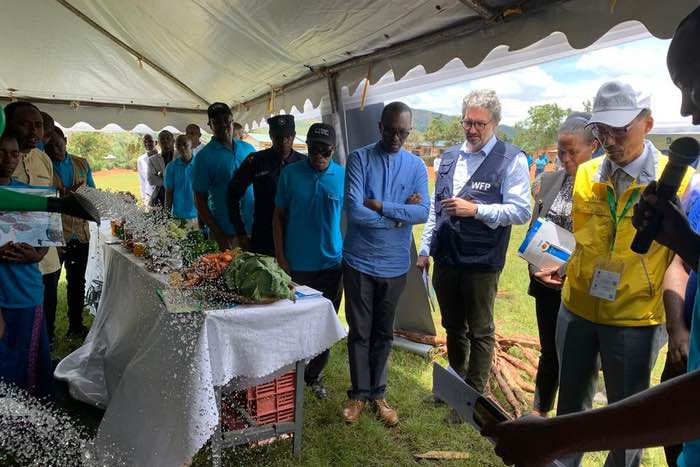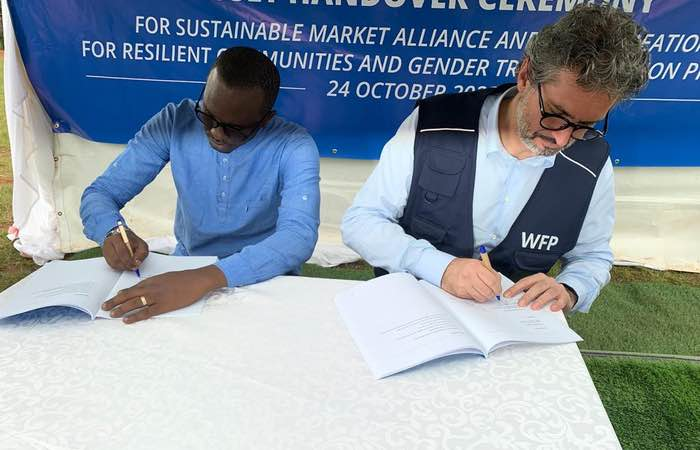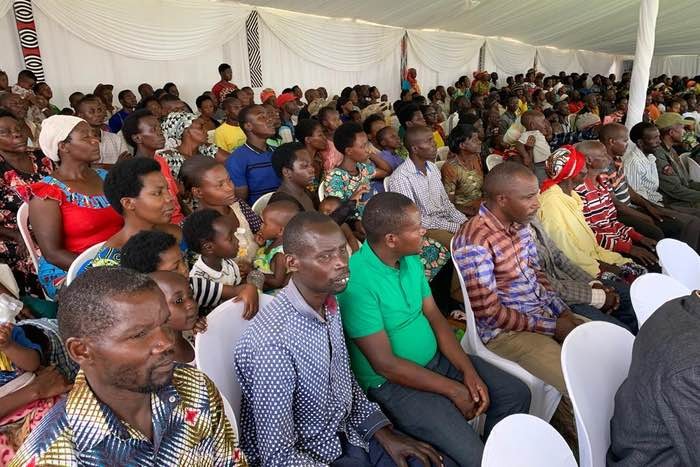
The World Food Programme (WFP) is proud to announce the successful handover of the assets created through the Sustainable Market Alliance and Asset Creation for Resilient Communities and Gender Transformation (SMART) project.
The four-year, USD 8 million project, which began in July 2020 and is scheduled to conclude in June 2024, has been implemented in five districts: Nyaruguru, Nyamagabe, Rutsiro, Karongi, and Kayonza.

This remarkable initiative was funded by the Republic of Korea through the Korea International Cooperation Agency (KOICA) and received complementary multilateral funding from the German Federal Ministry for Economic Cooperation and Development (BMZ).
The SMART project is dedicated to supporting rural communities in achieving ‘Zero Hunger,’ improving agricultural productivity, climate resilience, and promoting gender equality by enhancing access to food, sustainable agricultural practices, and market opportunities.
Collaborating with six NGO partners, including Good Neighbors International (GNI), DUHAMIC ADRI, Rwanda Development Organization (RDO), Rwanda Rural Rehabilitation Initiative (RWARRI), Mennonite Central Committee (MCC), and Cord-Aid, WFP has accomplished key outcomes.
These range from improved food security and resilience to shocks, increased agricultural productivity and marketable surpluses and strengthened capacity in the areas of nutrition, to gender, and climate-sensitive programme implementation.
Over 1,100 hectares of agricultural land have been rehabilitated using terracing on hillslopes and marshland rehabilitation approaches to prevent soil erosion and increase food production, benefiting 10,466 smallholder farmers in Rutsiro, Karongi, Nyamagabe, Nyaruguru and Kayonza districts.

Community-level irrigation systems were installed in Rutsiro, Nyaruguru and Kayonza benefitting 2,054 farmers on a total of 135 hectares of agricultural land. These efforts have directly improved the resilience and food security of nearly 47,000 households in the target communities. WFP also provided cash-based transfers worth USD 1 million, to enable the communities to meet their basic needs and focus on strengthening their livelihoods.
A total of 16,148 smallholder farmers received agricultural training, leading to a 121 percent increase in maize production. WFP facilitated connections between smallholder farmers and formal buyers, resulting in a substantial increase in maize sales, from 15.38 MT in 2021 to 265.38 MT in 2022.
Andrea Bagnoli, WFP Representative and Country Director, reaffirmed WFP’s commitment to supporting and empowering vulnerable communities in achieving zero hunger, ensuring access to adequate food and nutrition, promoting sustainable food systems, increasing smallholder farmers’ productivity, and assisting them during the post-harvest handling to minimize food waste.
He said: “Through the implementation of good agricultural practices, sustainable market access, and the creation of climate-resilient assets spanning over 1,100 hectares of land, this project has significantly improved food security and uplifted countless lives over the past three and a half years.”
Throughout the project, beneficiaries received capacity-building training in various areas, including good agricultural practices, cooperative strengthening including saving groups, livestock rearing, nutrition and gender-transformative activities.
The achievements of the SMART project stand as evidence of the collective work undertaken by the World Food Programme and the Government of Rwanda with many partners and communities. As the project transitions to the next phase, WFP reaffirms its commitment to the mutual goal of a gender-equal Rwanda- free from hunger and malnutrition. (End)
